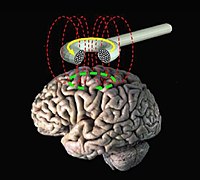
Motor cortical excitability during voluntary inhibition of involuntary tic movements
Sign Up to like & getrecommendations! Published in 2018 at "Movement Disorders"
DOI: 10.1002/mds.27479
Abstract: Background: Tics can be voluntarily inhibited. However, the neurophysiology of voluntary tic inhibition remains underexplored. The objective of this study was to explore state‐dependent effects of voluntary tic inhibition on M1 excitability. read more here.
Keywords: excitability voluntary; inhibition; motor cortical; voluntary inhibition ... See more keywords

Different cortical excitability profiles in hereditary brain iron and copper accumulation
Sign Up to like & getrecommendations! Published in 2019 at "Neurological Sciences"
DOI: 10.1007/s10072-019-04147-0
Abstract: Background and aim Neurodegeneration with brain iron accumulation (NBIA) and Wilson’s disease (WD) is considered the prototype of neurodegenerative disorders characterised by the overloading of iron and copper in the central nervous system. Growing evidence… read more here.
Keywords: copper; brain iron; cortical excitability; excitability ... See more keywords

Unilateral strength training of the less affected hand improves cortical excitability and clinical outcomes in patients with subacute stroke: a randomized controlled trial.
Sign Up to like & getrecommendations! Published in 2021 at "Archives of physical medicine and rehabilitation"
DOI: 10.1016/j.apmr.2020.12.012
Abstract: OBJECTIVE To investigate whether unilateral strength training helps improve cortical excitability and clinical outcomes after stroke. DESIGN Randomized controlled trial SETTING: Rehabilitation sciences research center PARTICIPANTS: 26 patients with subacute stroke were randomly assigned to… read more here.
Keywords: strength; less affected; clinical outcomes; unilateral strength ... See more keywords

Cortical excitability changes as a marker of cognitive impairment in Parkinson’s disease
Sign Up to like & getrecommendations! Published in 2022 at "Behavioural Brain Research"
DOI: 10.1016/j.bbr.2022.113733
Abstract: Cognitive impairment of different severity with eventual progression to dementia in Parkinson's disease (PD) appears during the course of the disease. In this study, transcranial magnetic stimulation (TMS) was used to assess cortical excitability changes… read more here.
Keywords: excitability changes; impairment; parkinson disease; cognitive impairment ... See more keywords

tDCS over posterior parietal cortex increases cortical excitability but decreases learning: An ERPs and TMS-EEG study
Sign Up to like & getrecommendations! Published in 2021 at "Brain Research"
DOI: 10.1016/j.brainres.2020.147227
Abstract: The application of anodal transcranial direct current stimulation (AtDCS) is generally associated with increased neuronal excitability and enhanced cognitive functioning. Nevertheless, previous work showed that applying this straight reasoning does not always lead to the… read more here.
Keywords: posterior parietal; parietal cortex; atdcs; cortical excitability ... See more keywords

Neuropeptide Y as a possible homeostatic element for changes in cortical excitability induced by repetitive transcranial magnetic stimulation
Sign Up to like & getrecommendations! Published in 2018 at "Brain stimulation"
DOI: 10.1016/j.brs.2018.02.017
Abstract: BACKGROUND Repetitive transcranial magnetic stimulation (rTMS) is able to modify cortical excitability. Rat rTMS studies revealed a modulation of inhibitory systems, in particular that of the parvalbumin-expressing (PV+) interneurons, when using intermittent theta-burst stimulation (iTBS).… read more here.
Keywords: stimulation; repetitive transcranial; transcranial magnetic; magnetic stimulation ... See more keywords

Priming the pump? Evaluating the effect of multiple intermittent theta burst sessions on cortical excitability in a nonhuman primate model
Sign Up to like & getrecommendations! Published in 2022 at "Brain Stimulation"
DOI: 10.1016/j.brs.2022.04.004
Abstract: Leveraging preclinical knowledge regarding the role of hippocampal theta burst stimulation in learning and memory, in 2005 Huang and colleagues were the first to apply an intermittent bursting form of transcranial magnetic stimulation (theta burst… read more here.
Keywords: cortical excitability; stimulation; theta burst;

Dynamic Modulation of Cortical Excitability during Visual Active Sensing
Sign Up to like & getrecommendations! Published in 2019 at "Cell reports"
DOI: 10.1016/j.celrep.2019.05.072
Abstract: SUMMARY Visual physiology is traditionally investigated by presenting stimuli with gaze held constant. However, during active viewing of a scene, information is actively acquired using systematic patterns of fixations and saccades. Prior studies suggest that… read more here.
Keywords: dynamic modulation; modulation; active viewing; modulation cortical ... See more keywords

O13 Exploring the modulators of cortical excitability
Sign Up to like & getrecommendations! Published in 2017 at "Clinical Neurophysiology"
DOI: 10.1016/j.clinph.2017.07.024
Abstract: Objectives Fluctuations in cortical excitability is a candidate mechanism involved in the trial-to-trial variation of motor evoked potentials (MEPs) to transcranial magnetic stimulation. We explore if oscillations in the infraslow (0.01–0.1 Hz), delta, theta, alpha and… read more here.
Keywords: mep presence; presence absence; cortical excitability; excitability ... See more keywords

P225 Effect of 30, 50 and 100Hz tetha burst stimulation on healthy individuals
Sign Up to like & getrecommendations! Published in 2017 at "Clinical Neurophysiology"
DOI: 10.1016/j.clinph.2017.07.233
Abstract: Objective Continuous tetha burst stimulation (cTBS) protocol mainly consists of 3 stimulus bursts repeating every 200 ms at 50 Hz and It has been interpreted that cTBS had inhibitory effects on human motor cortex. On the other… read more here.
Keywords: ctbs; tetha burst; cortical excitability; motor ... See more keywords

The effect of psychotropic drugs on cortical excitability and plasticity measured with transcranial magnetic stimulation: Implications for psychiatric treatment.
Sign Up to like & getrecommendations! Published in 2019 at "Journal of affective disorders"
DOI: 10.1016/j.jad.2019.04.067
Abstract: OBJECTIVE Repetitive transcranial magnetic stimulation (rTMS) is an emerging treatment for neuropsychiatric disorders. Patients in rTMS treatment typically receive concomitant psychotropic medications, which affect neuronal excitability and plasticity and may interact to affect rTMS treatment… read more here.
Keywords: excitability plasticity; treatment; transcranial magnetic; cortical excitability ... See more keywords